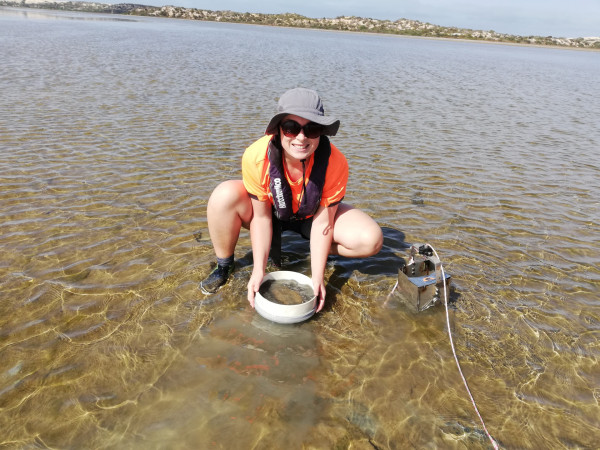Posted on 06 July 2022
Te Au o Te Moana - Voice of the Ocean: Vera Rullens
- News
- Blue economy Cumulative effects Improving ecosystem health Risk and uncertainty National
- 3 Minutes to read
Vera Rullens is a researcher based in Melbourne who works with Sustainable Seas through the University of Waikato. Vera joined Sustainable Seas as a PhD student, and now her research involves looking into stressors on our marine environments and developing decision-making tools.
When she was 11 and growing up in the Netherlands, Vera read a book about marine biologists living on a boat.
“It had something to do with dolphins. That’s my first recollection of realising there’s people who do this for a living … wow, how amazing would that be?
“I told my parents I was going to be a marine biologist, and it has been something that's stuck. I've always wanted to study marine biology.”
As a child Vera loved going to the beach, and her curiosity about what lay beneath the water grew. Fortunately, she had a love of biology and science that helped her achieve her dream.
Vera is passionate about protecting the moana and says people can sometimes forget how much we rely on it.
“When we’re explaining our research people often connect to it when we bring up personal experiences – like going fishing for kai or going to the beach and having a moment of peace or reflection.
“There are so many benefits and values that are provided by the marine environment that we may not necessarily be thinking about. There is so much to look after.”
She explains how there isn’t one problem affecting our moana, but many. Her work with the Sustainable Seas through the University of Waikato on the Communicating risk and uncertainty project investigates different pressures on marine ecosystems, and how they interact.
“For example, sedimentation can be a big stressor in our estuaries, so can eutrophication (an excess of nutrients), and algal blooms, but there are also emerging stressors related to climate change.
“Individually, we may think that setting a certain limit for sedimentation or nutrient run-off from land is appropriate. But if we don't understand how this may interact with other stressors, that limit may be too high. If we are unsure about stressor effects, we may want to set a more conservative limit.”

She says the research is “modelling multiple-stressor impacts on estuarine ecosystems and how that impacts our management actions from a risk and uncertainty perspective”. Vera’s study and work has taken her around the world. It’s always the beach that grounds her when she’s in a new place.
“When you're somewhere new and you go to the beach it feels familiar, but also exciting. That's when I feel the closest connection to the ocean - when I get to explore a new place.”
She says that we can all do our part when it comes to taking care of the ocean. To be less wasteful, and to think about how to reduce their carbon footprint.
“People need to be aware that their actions on land have an impact on the sea. Out of sight shouldn't be out of mind. Lots of small positive actions or changes done by lots of people can have a big environmental impact.”
“It’s tough. It's always a trade-off between people's wants and needs and needing to move forward sustainably. There’s no clear answer to how to best manage everything, but I think a big step forward is to look at it as a system rather than individual activities or individual stressors.”
Vera loves figuring out how stressors or human activities come together and affect our environment - and she hopes her research can help with Aotearoa New Zealand’s move towards holistic ecosystem-based marine management.